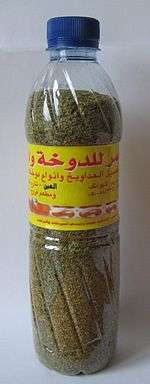Dokha

| Part of a series on |
| Tobacco |
|---|
 |
| History |
| Biology |
| Personal and social impact |
| Production |
Dokha (Arabic: دوخة, "Vertigo") is an Arabian tobacco blend, consisting of dried and finely shredded tobacco mixed with leaves, bark and herbs. The tobacco product is popular in the United Arab Emirates, Oman, Qatar, Saudi Arabia, Bahrain, Jordan, and other Middle Eastern countries. It typically has a very high nicotine content, so users will usually smoke a small amount at a time. Unlike hookah tobacco, or shisha, dokha is not cured with molasses.
Unlike most tobaccos, dokha is not fire cured and cut, but dried in the arid desert region from which it came. It is finely ground in a timely delicate manner to preserve the content of the tobacco, its strength, freshness and flavor. Due to the lesser degree of processing, dokha tobacco appears essentially unaltered. This allows it to maintain the green coloration of the natural plant. The tobacco, is then carefully blended with herbs and spices which creates the complex flavors.[1]
Dokha is commonly smoked out of an elongated wooden pipe called a midwakh (alternatively spelled 'medwakh'). The traditional midwakh has no filter, but more recent variations contain a stem-mounted filter to reduce heavy particulate matter entering the lungs while smoking.
Dokha and its legality is dictated by the same legislation as tobacco.
History
Dokha tobacco and its derivatives have been cultivated and used in Middle Eastern countries for approximately 500 years. Traditionally, it was made using Arabic tobacco plants blended with herbs, spices, dried flowers and fruits. Depending on local traditions, bark and leaves of indigenous plants were also used.[2]
Modern dokha maintains many of the characteristics of its traditional forms, consisting of tobacco and spices without any preservatives, pesticides, herbicides or additives that are commonly used in mass-produced tobacco products. In many countries where dokha is used, there are a number of available tobacco strengths (typically described in Arabic as "hot", "warm" or "cold"), which coincide with the harshness of a particular dokha blend.[2]
Acute Effects
Dokha produces a "buzz" that, according to users and retailers, generally lasts for 30 seconds to 2 minutes,[3][4] described as being lightheaded or dizzy, consistent with the acute physiological effects of nicotine consumption.
Limited studies have been performed on the acute effects of dokha use, but the currently observed effects include:[5]
- Increased systolic blood pressure
- Decreased diastolic blood pressure
- Increased heart rate and respiration
Chronic Effects
Personal accounts from users and marketing materials from dokha retailers claim that the relatively smaller amount of dokha smoked at one time compared to more commonly used forms of tobacco (like cigarettes, chewing tobacco or hookah), make it a safe (or safer) product to use.[6] Health professionals consider this as likely a myth, and that more research is needed to investigate the adverse effects,[7] as there is little comparative study between dokha and other tobacco products.[6]
As dokha is pure tobacco, the suspected health effects from prolonged use are similar to that of other tobacco products:
- Chronic chest infections
- Chronic cough
- Increased risk of cancer, especially those of the mouth, throat and lungs
- Oral lesions[8]
References
- ↑ "Dokha History - www.enjoy-dokha.co.uk". www.enjoy-dokha.co.uk. Retrieved 2016-06-22.
- 1 2 "What is Dokha? - Online Information – Masters of Medwakh". Masters of Medwakh. Retrieved 2016-06-22.
- ↑ "Dokha.com - About Dokha". www.dokha.com. Retrieved 2016-06-22.
- ↑ "What is Dokha? | Herbal Tobacco Company". www.herbaltobacco.in. Retrieved 2016-06-22.
- ↑ Shaikh, Rizwana B.; Abdul Haque, Noor Mohammad; Abdul Hadi Khalil Al Mohsen, Hassan; Abdul Hadi Khalil Al Mohsen, Ali; Haitham Khalaf Humadi, Marwa; Zaki Al Mubarak, Zainab; Mathew, Elsheba; Al Sharbatti, Shatha (2012-01-01). "Acute effects of dokha smoking on the cardiovascular and respiratory systems among UAE male university students". Asian Pacific journal of cancer prevention: APJCP. 13 (5): 1819–1822. ISSN 1513-7368. PMID 22901128. doi:10.7314/apjcp.2012.13.5.1819.
- 1 2 Vupputuri, S.; Hajat, C.; Al-Houqani, M.; Osman, O.; Sreedharan, J.; Ali, R.; Crookes, A. E.; Zhou, S.; Sherman, S. E. (2014-10-23). "Midwakh/dokha tobacco use in the Middle East: much to learn". Tobacco Control. 25: tobaccocontrol–2013–051530. ISSN 1468-3318. PMC 4789808
 . PMID 25342581. doi:10.1136/tobaccocontrol-2013-051530.
. PMID 25342581. doi:10.1136/tobaccocontrol-2013-051530. - ↑ "Myth that smoking medwakh is safer than smoking cigarettes ‘needs to be dispelled’ | The National". www.thenational.ae. Retrieved 2016-06-22.
- ↑ Hassona, Y.; Scully, C. (2015-07-01). "Dokha: an emerging smoking habit with possible oral effects". Oral Diseases. 21 (5): 679–680. ISSN 1601-0825. PMID 25690423. doi:10.1111/odi.12324.